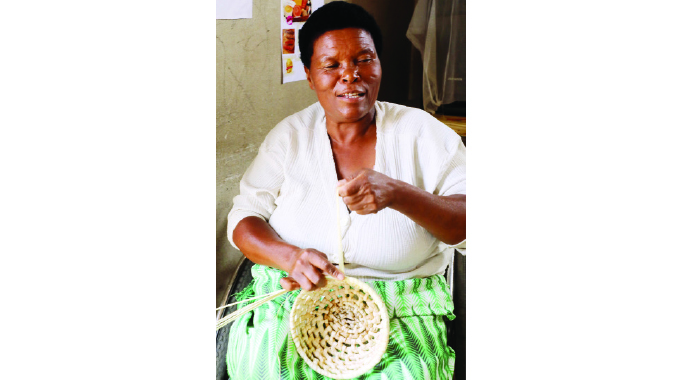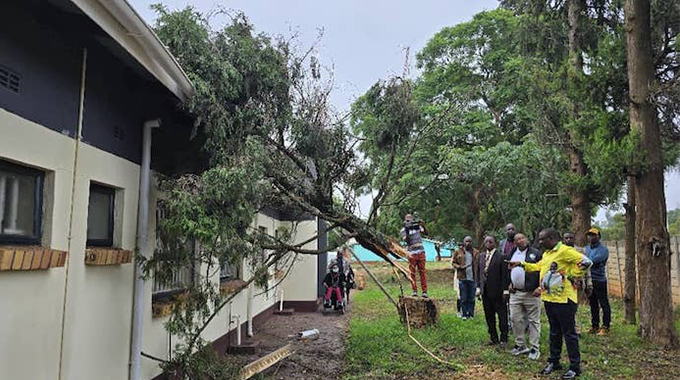‘Don’t remarry, work the land’

Bongani Ndlovu, Chronicle Reporter
“WHY should I work so hard in my life and then remarry, only for a man to come and eat the sweat off my brows?”
These are the words of Mrs Getrude Ndiweni (57) who has two children from a previous marriage that broke down in the late 1990s.
In her second marriage, she was widowed in 2007 and left to her name was a plot and a dog.
Mrs Ndiweni lives on a plot in Umguza District, about 30km along the Bulawayo-Nyamandlovu Road, where she is involved in various agricultural activities.
Driving to her plot, on the left side, there is a thriving 1 hectare maize field where two Jojo tanks are set in the middle. It’s the summer cropping season and by the look of it, Mrs Ndiweni is in line for a bumper harvest.
As she opens her gate, just on the right there is a shed containing a grinding mill, to the left a house at foundation level is being constructed. Cows are mooing in the kraal situated at the back of the property, while to its left there is a cattle spray booth.
There is a lot that is going on at the plot, and Mrs Ndiweni is ever so proud that she has achieved much, as a woman who was widowed all those years ago.
She said in 2007 she never thought that her world had stopped when her husband died, remaining positive that it was just the beginning of a journey of self-emancipation.
Mrs Ndiweni said she bought a dog, which has since died, to keep her company and safe as her husband had left her with nothing.
“We started staying in this resettlement in 2001 at the height of the noble land reform programme. When my husband died in 2007, I was left alone on this plot as my children had left for the diaspora. I bought a dog, and it was just the two of us. My two children were against the idea that I live in the rural area, pleading with me to leave. I didn’t take note of them,” she said.
Mrs Ndiweni saidshe started off without even a bag of maize seed when she tilled her land.
“Through hard work, I started farming. In 2008 during the hyperinflationary period, there was a truck that would deliver food to Nyamandlovu passing by my plot.
“Sacks in these trucks would be leaking and would leave a trail of maize kernels. I picked a lot of that maize and I planted it in this field just in front of the house. I got enough maize to buy a cow. In 2009 I did the same and then I was able to buy another cow. Now I have 25 cattle in my kraal,” said Mrs Ndiweni.

She said she managed to buy a grinding mill after selling some of her cattle and a cattle spray booth that services the community. The booth is an efficient way to spray cattle to fight diseases and it uses less water compared to a dip tank.
Mrs Ndiweni said it was only later that her two sons realised that their mother was not bothered about handouts from them and they started enquiring what should be done at the plot.
“Recently, one of my children saw that I was not bothering them for money, and saw the progress on the plot. He asked what I wanted and I said a borehole, that’s what I have installed alongside two Jojo tanks that help in irrigating the maize field. He also helped me connect electricity. We are in the city now,” said Mrs Ndiweni, while pointing to a lamp post in the middle of her yard.
Mrs Ndiweni said the three-bedroomed house that is at foundation level is wholly funded by her children in the diaspora along with the fowl run.
She said she did not and still does not want to be a burden to her children and through her hard work she has made great progress on the plot.
Mrs Ndiweni said there is no chance that she will get married again.
“I wish widows like me could be more diligent and fend for themselves, that could be better. Not that when their husbands die, the first thing on their minds is to look for another man to look after her and her children.
“This person will divert you from your plans. Imagine if I had looked for a man, I would have left this plot and followed him to his home and I would have nothing. Even now, I won’t get married or have a husband. I have developed this place so much not for some man to just come in and just sit and eat my sweat,” said Mrs Ndiweni.
She said women must not depend on men as “they are feeble beings who can die anytime”.
“As women, we shouldn’t always depend on our husbands. These people can die anytime without notice leaving you alone in this world. If you have a husband or as a woman in general, you must be innovative and work hard even if your husband is working.
“The men in our society we call our breadwinners aren’t strong. What will happen, when he dies, you think of remarrying so that you keep your late husband’s children in another men’s family. This can lead to sexual abuse of children, especially the girl child,” said Mrs Ndiweni.
In her spare time, Mrs Ndiweni loves to interact with her grandchildren who she said visited her in Zimbabwe from the United Kingdom during the festive season
“My grandchildren visited me from the United Kingdom and I said to their parents they should come and live with me. I showed them how to plaster a hut using mud and dung like how we used to do. They loved being here and seeing live animals, such as chickens and goats. They thought the meat they were eating came from the store,” said Mrs Ndiweni.
Looking into the future, Mrs Ndiweni wants to expand her farming to planting cabbages and installing drip irrigation since she now has a steady supply of water.












Comments